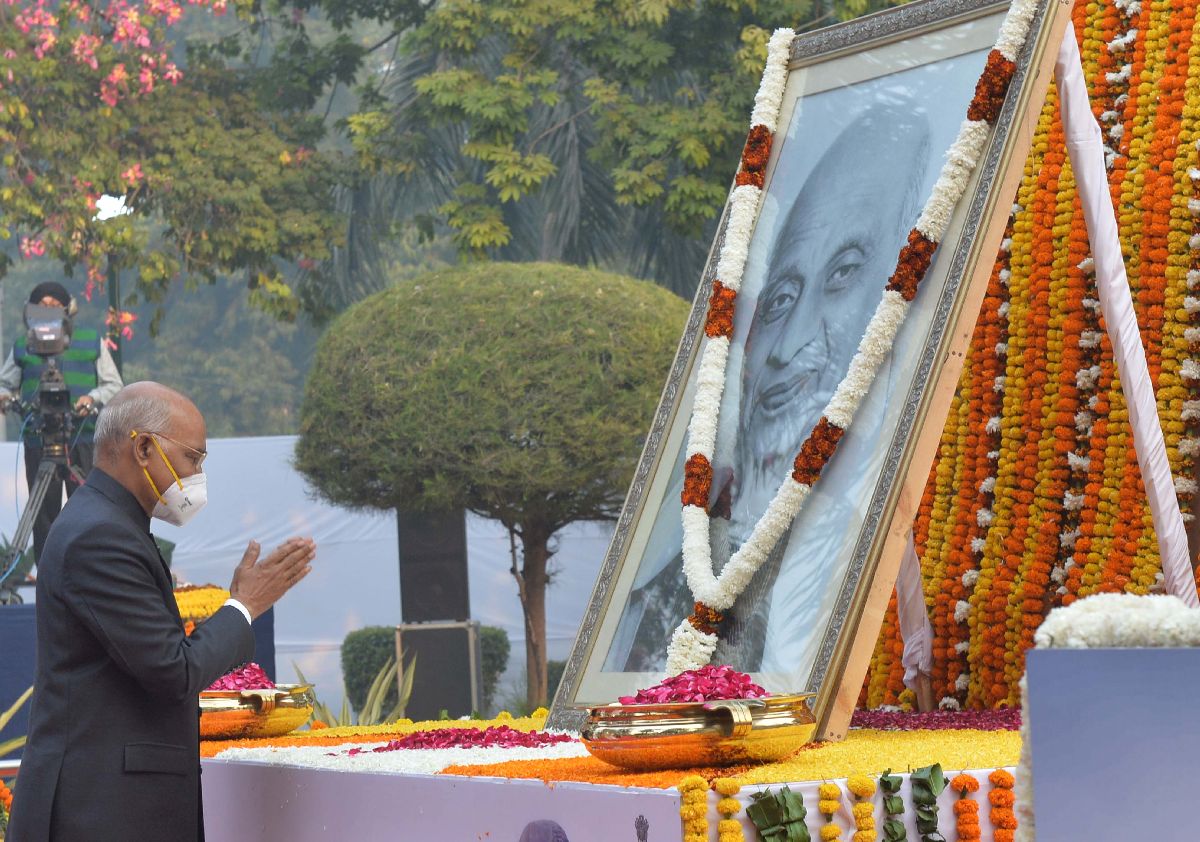


On the birth anniversary of India's first Home Minister, Sardar Vallabhbhai Patel, President Droupadi Murmu, Vice President Jagdeep Dhankhar, Prime Minister Narendra Modi, and other dignitaries gathered at the Patel Chowk to pay tribute to his leadership and dedication to national integration. This day serves as a reminder of Patel's efforts to unite India's diverse princely states and promotes a sense of solidarity among the people. The event was also attended by Delhi Lieutenant Governor V K Saxena, Union Ministers of State for Home Affairs and BJP MP Bansuri Swaraj.
National Unity Day: Honoring the Legacy of Sardar Vallabhbhai Patel
On October 31, India commemorates National Unity Day, a day dedicated to remembering the contributions of Sardar Vallabhbhai Patel, India's first Home Minister, to the country's integration and unity.
Background
After India's independence in 1947, the nation inherited a legacy of over 560 princely states, each with its own governance system. The task of integrating these states into a unified nation fell upon Sardar Patel.
With his unwavering resolve and diplomatic skills, Patel embarked on a mission to convince the rulers of these states to accede to the Indian Union. Through negotiations and persuasive diplomacy, he successfully integrated most of the states within a year.
Historical Significance
The integration of princely states was a monumental achievement that ensured India's territorial integrity and prevented it from becoming a fragmented nation. Patel's vision for a united India, free from internal divisions, has made him a revered figure in Indian history.
Commemoration of National Unity Day
National Unity Day is observed every year on October 31, the birth anniversary of Sardar Patel. On this day, various events are held across the country to pay tribute to his legacy and promote unity among the Indian people.
Key Events in 2023
Top 5 Frequently Asked Questions (FAQs)
Sardar Vallabhbhai Patel was India's first Home Minister and is widely regarded as the "Iron Man of India." He played a pivotal role in integrating India's princely states and promoting national unity.
National Unity Day is observed to commemorate the birth anniversary of Sardar Patel and to honor his contributions to Indian integration and unity.
The "Run for Unity" symbolizes the spirit of unity and solidarity that Patel envisioned for India. It encourages citizens from all walks of life to come together and promote national integration.
You can participate in National Unity Day by attending events, pledging to promote unity, or joining the "Run for Unity."
To promote national unity, you can foster respect for diversity, encourage dialogue and understanding, and actively work to break down barriers between different sections of society.

Prime Minister Narendra Modi addressed his first election rally in Bihar and expressed confidence in winning the upcoming polls. He mocked the opposition INDIA bloc and praised the unity within NDA, highlighting leaders like Nitish Kumar, Chirag Paswan, Jitan Ram Manjhi, and Upendra Kushwaha. Modi also criticized the 'jungle raj' under RJD and Congress and highlighted Bihar's progress under Nitish Kumar's tenure. Despite the upcoming Chhath festival, the PM thanked the crowd for attending and described the recent GST rate revision as a 'festival of savings'.

The suspension of Praveen Kumar K P, a PDO serving in Sirwar taluk of Raichur district, for participating in an RSS rally has sparked controversy in Karnataka. BJP leaders have condemned the move and promised to fight it legally, claiming that the officer's right to participate in such events is protected by law. Meanwhile, the state's Rural Development Minister has written to the Chief Minister for a ban on RSS activities on government premises, further intensifying the issue.

In a heated verbal exchange, Maratha quota activist Manoj Jarange Patil accused NCP Minister Chhagan Bhujbal of attempting to create a rift between the OBC and Maratha communities for political gain. During a recent OBC rally in Beed, Bhujbal and Dhananjay Munde attacked Jarange, with Pankaja Munde, a BJP OBC leader, watching from the sidelines. Jarange also praised Chief Minister Devendra Fadnavis and Minister Pankaja Munde for staying away from the rally and emphasized the unity of the OBC community. Bhujbal, on the other hand, warned Jarange against challenging the community's rights and vowed to stand up against any attempts to divide them.

On the auspicious occasion of Bhai Dooj, Madhya Pradesh Chief Minister Mohan Yadav transferred a total of 44,900 crore directly into the bank accounts of 1.27 crore women beneficiaries under the Ladli Bahna Yojana. This initiative aims to support and empower women in the state, with each eligible woman set to receive 1,500 per month from November onwards. During the special program at the Chief Minister's residence, Yadav extended his wishes for a happy Bhai Dooj, emphasizing the importance of the brother-sister relationship and the government's commitment towards ensuring the safety and well-being of Ladli Bahnas in the state.

Union Home Minister Amit Shah celebrated the Gujarati New Year and his 62nd birthday in his hometown of Ahmedabad, surrounded by senior political leaders, party members, and well-wishers. Shah's rise in public life through the RSS and his partnership with Prime Minister Narendra Modi have shaped Gujarat's and India's political narrative. His sharp organisational mind, efficient approach, and booth-level political management have been key in building the "Gujarat model" that gave the BJP an enduring edge. Despite transitioning to national politics, Shah's political heart still beats in Ahmedabad, as evident in his New Year celebrations and plans to meet the newly appointed ministers of the Gujarat cabinet.

In a recent incident at the Vasai Fort in Maharashtra, a man dressed as Chhatrapati Shivaji Maharaj got into a heated argument with a security guard over language. The man, who was recording a video, berated the guard for not speaking Marathi and disrespecting the legacy of Shivaji Maharaj. Social media users were divided in their opinions, with some criticizing the man's behavior while others felt the guard needed to be taught a lesson.

In a significant moment for gender equality, President Droupadi Murmu became the first woman to visit the Lord Ayyappa Temple in Sabarimala. Accompanied by her team, she performed Darshan and Puja at the shrine, praying for the well-being and prosperity of her fellow citizens. Her visit symbolized the Supreme Court's decision to lift the ban on menstruating women entering the temple, reminding us that devotion knows no gender barriers.

With early voting just days away, the three major candidates vying to become New York City's next mayor are gearing up for the final debate in what could be their last chance to sway voters. The debate, hosted by Spectrum NY1, The City, and WNYC/Gothamist, will cover issues such as affordability, crime, and the role of former President Donald Trump in the city's politics. With the stakes high and the clock ticking, Democrats Zohran Mamdani and Andrew Cuomo and Republican Curtis Sliwa will need to make a strong case for themselves to secure the future of New York City.

CM Yogi Adityanath's statement about the role of "political Islam" in undermining Sanatan Dharma has sparked controversy and discussion throughout the nation. During an event organized by the Rashtriya Swayamsevak Sangh (RSS), he highlighted the struggles of Indian warriors against political Islam, claiming that this aspect of history is often overlooked. Adityanath's remarks have renewed debates on the representation of India's historical narrative and the impact of colonialism and political Islam.

Samajwadi Party chief Akhilesh Yadav's remarks questioning the government's spending on Diwali celebrations in Ayodhya, and his comparison to Christmas festivities worldwide, have sparked controversy. While the BJP has accused Yadav of being envious of Ayodhya's success, the Vishva Hindu Parishad has criticized him for undermining Indian culture. The comments highlight the tension between political parties over religious and cultural events.